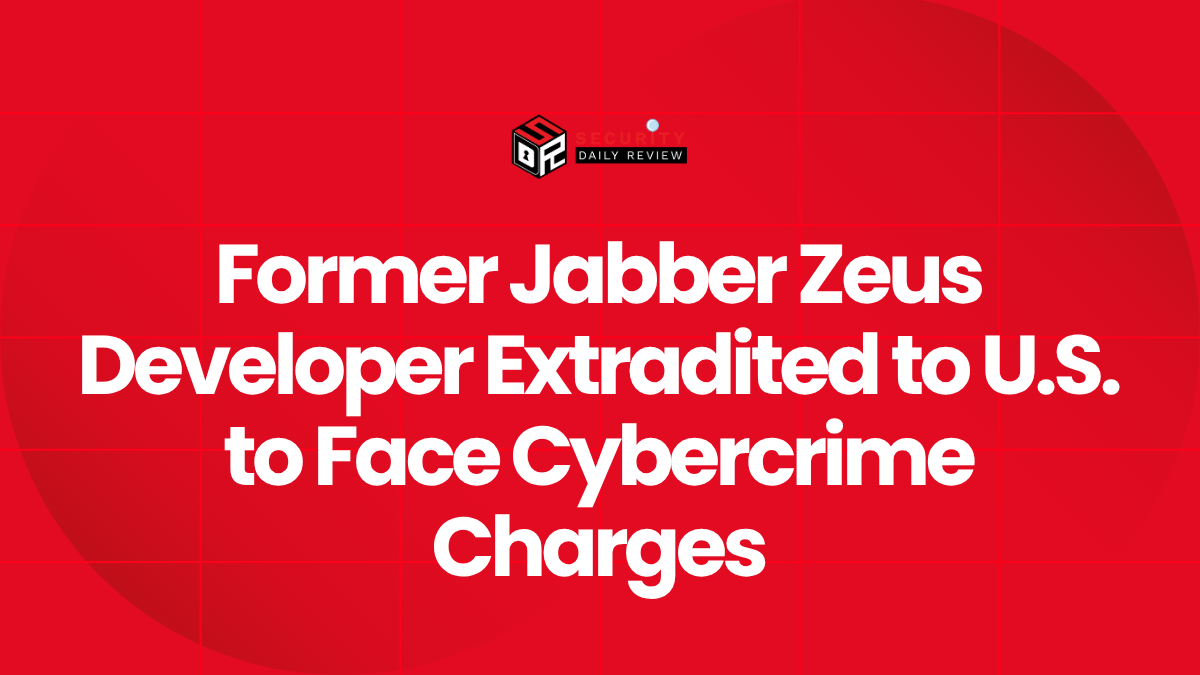Ukrainian national Yuriy Igorevich Rybtsov, long known by the online pseudonym “MrICQ,” has been extradited from Italy to the United States where he faces a criminal indictment tied to his alleged role in the development and deployment of Jabber Zeus malware. Authorities claim his actions played a central role in a wide-ranging cybercrime scheme involving financial theft and fraud.
Rybtsov, 41, was initially apprehended by Italian authorities while traveling abroad and detained based on a U.S. extradition order. After exhausting the appeals process, he was transferred to U.S. custody earlier this month.
Jabber Zeus Allegations Trace Back More Than a Decade
The Jabber Zeus campaign has long been attributed to financial malware attacks in the early 2000s. According to U.S. prosecutors, Rybtsov’s alleged contributions sit at the heart of a sophisticated banking Trojan platform that enabled coordinated cyber theft on a global scale.
Malware Designed For Bank Fraud
According to criminal filings, Jabber Zeus (also known simply as Zeus or Zbot) functioned as a banking Trojan designed to facilitate credential theft and unauthorized transactions from infected systems. The malware leveraged web injects and keystroke logging to gather sensitive information, such as:
- Online banking credentials
- Multifactor authentication tokens
- Account access patterns and behavioral signatures
Prosecutors allege that MrICQ’s code served as a backbone for command and control servers, linking infected endpoints to criminal operators.
“The Jabber Zeus malware enabled a large-scale, organized effort to steal millions of dollars from crime victims and financial institutions alike,” U.S. federal prosecutors said in court filings.
Actor Allegedly Supported Criminal Infrastructure
Rybtsov is accused of helping sustain and manage the infrastructure behind Jabber Zeus, particularly its communications via the Jabber/XMPP instant messaging protocol. This encrypted channel allegedly allowed attackers to control infected endpoints while evading traditional detection methods.
Rybtsov’s suspected involvement included writing or maintaining the malware’s codebase, integrating delivery mechanisms, and enhancing stealth capabilities. Combined, these aspects made Jabber Zeus notoriously effective at avoiding antivirus detection and establishing persistent access on infected machines.
Extradition Marks a Rare Win in Pursuit Of Eastern European Cyber Actors
Rybtsov’s transfer to the U.S. marks a significant move for law enforcement, which has long struggled to extradite Eastern European nationals involved in international cybercrime.
Arrest Took Place in Italy During 2023
Rybtsov was arrested in 2023 by Italian authorities while traveling abroad. Italy, a cooperative partner in transnational cybercrime investigations, upheld the U.S. extradition request despite Rybtsov’s appeal to remain in Europe. His legal efforts to block the transfer delayed proceedings but ultimately failed in Italian court.
This case highlights judicial momentum in the U.S.-EU collaboration on cybercrime enforcement. It also emphasizes the growing willingness of EU member states to detain and extradite cybercrime suspects with ties to long-running malware campaigns.
Legal Proceedings Expected in U.S. District Court
Rybtsov will now face charges before a federal district court where prosecutors are expected to outline his role in the broader Jabber Zeus ecosystem. The exact charges have not yet been made public, but they are expected to include multiple counts of:
- Wire fraud and bank fraud
- Conspiracy to commit computer intrusion
- Identity theft and access device fraud
If convicted, he could face a lengthy prison sentence in a federal facility, particularly if prosecutors pursue charges under the Computer Fraud and Abuse Act (CFAA) and other financial crime statutes.
Continuing Relevance of Jabber Zeus in Cybersecurity Operations
The extradition of Rybtsov reaffirms the long-term impact of legacy malware families like Zeus on modern cybercrime operations, as well as the continued interest of law enforcement in bringing historical actors to justice.
Zeus derivatives and spinoffs remain active in today’s threat landscape. Many remote access trojans (RATs), banking Trojans, and botnets trace their architectural and operational lineage to Zeus and similar early-2000s malware frameworks.
Security firms continue to detect obfuscated Zeus variants in phishing campaigns, malicious attachments, and counterfeit software installers. While original Jabber Zeus infrastructure has been dismantled, many of its techniques—like encryption, stealth C2 channels, and credential harvesting—remain prevalent in current malware campaigns.
Global Cooperation and the Legacy of Banking Malware
Federal prosecutors are expected to proceed with pretrial motions in the coming months as Rybtsov’s case enters the U.S. legal system. This extradition underscores growing cooperation between international law enforcement agencies and renewed efforts to dismantle the infrastructure—and hold accountable the developers—that support persistent cybercriminal operations.
Cybersecurity professionals may find value in revisiting legacy malware families like Zeus as a reference point for understanding today’s banking Trojans and credential theft strategies. As the Rybtsov case unfolds, analysts will be watching closely for insights into the evolving interplay between malware development and transnational cybercriminal networks.









